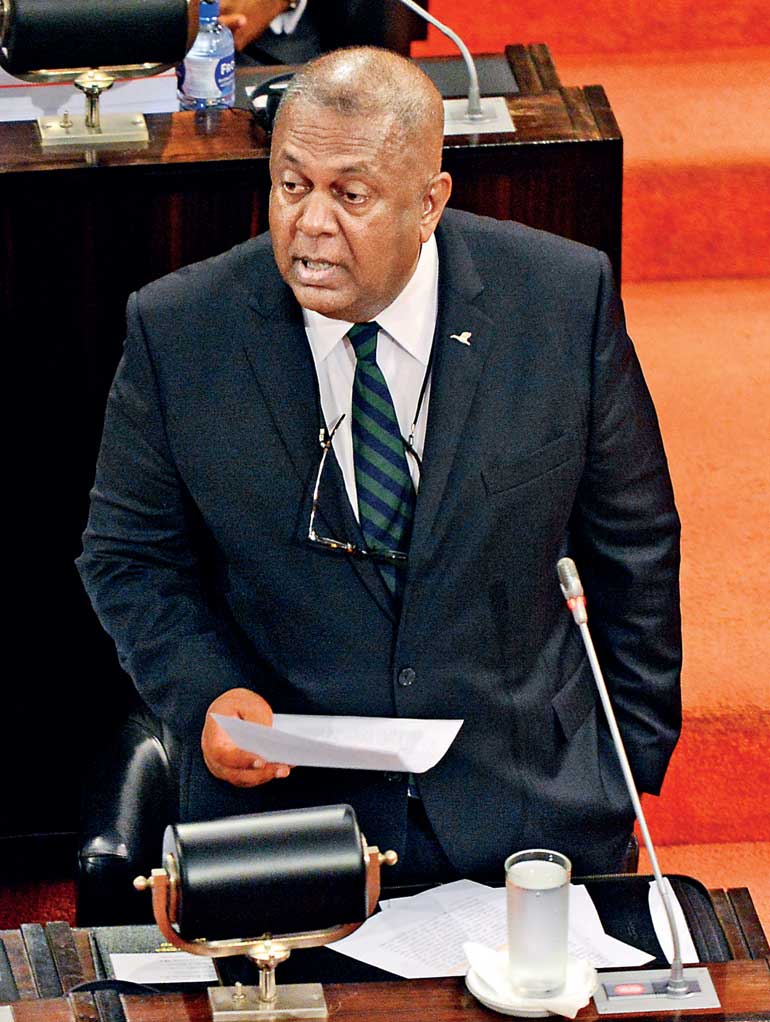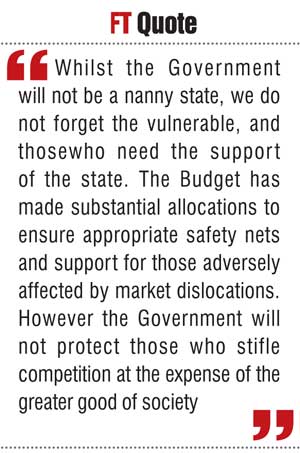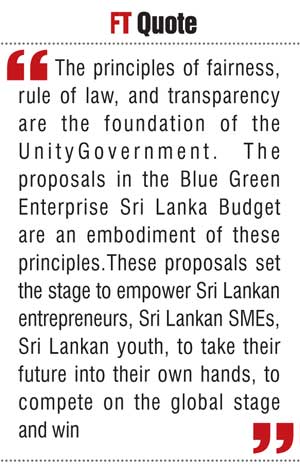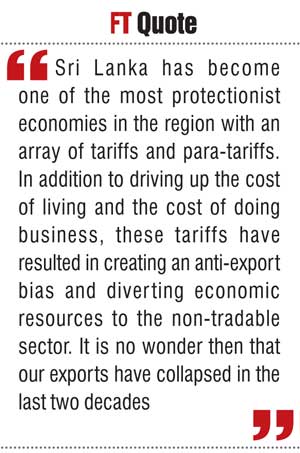Monday Feb 23, 2026
Monday Feb 23, 2026
Monday, 11 December 2017 00:00 - - {{hitsCtrl.values.hits}}
Following is the speech delivered by Finance and Media Minister MangalaSamaraweera at the Third Reading of Budget 2018 on 9 December
 Finance and Media Minister Mangala Samaraweera
Finance and Media Minister Mangala Samaraweera
Hon. Chairman,I am delighted to begin my speech with the good news that today we received $ 292 million as the first tranche of the Hambantota Port PPP joint venture. This is but the first step in realising the true commercial value of the port after seven long years.
The joint venture PPP partnership with China Merchant Port Holdings (CMPH), a member of China Merchant Group which owns a network of 49 ports across Asia, Africa, Europe and the Mediterranean, will enable Hambantota Port to benefit from the broader trade and shipping network that CMPH will provide access to.
These network benefits have already been demonstrated in the success of the Colombo International Container Terminal. CMPH has operated successful models of similar industrial ports in Asia and Africa and this proven track record gives us confidence that the partnership will result in vessel traffic and industrial investment, enabling the Hambantota port to finally generate the cash flows to make it a viable investment.
By linking with global value chains in goods and services, taking advantage of the trade-investment nexus, Sri Lanka can truly fulfil its position as an economic hub of the Indian Ocean. The Hambantota Port PPP will generate FDI, create exports and most importantly create jobs that will empower Sri Lankan youth. Jobs, empowerment, exports, and FDI are in fact some of the key focus areas of Budget 2018.
Hon. Chairman, the 2018 Budget is founded on the themes of a Blue Green Budget and Enterprise Sri Lanka. This is a budget to harness Sri Lanka’s marine and natural resources in a sustainable manner, whilst unleashing the true potential of our greatest resource – our people.

For too long our people have been suppressed by an overbearing state and by archaic legislation which are a vestigial link to our colonial past. Our education systems have excluded our talented youth and denied opportunities for the realisation of their capabilities. Young entrepreneurs have been unable to access affordable finance to bring to life their business ideas. As a result, our youth have become accustomed to waiting for the Government to provide them with some relief – be it a Government job, or some form of concession or handout. Our companies got accustomed to open ended protection from competition. Sri Lanka as a whole got stifled into a defensive mindset.
This Budget is the first step in a journey to reverse this mindset and to empower Sri Lankans to take control of their own destiny. The Budget focuses on liberalisation to unlock the barriers to greater investment, trade, and start-up enterprises. It also allocates resources to provide training and skill development for youth to equip them with the capabilities to take advantage of such opportunities.
We envisage the day when the farmer’s daughter becomes an agribiz-entrepreneur, when the fisherman’s son becomes a seafood exporter. Sri Lanka needs to go back to its roots of being a nation of entrepreneurs, a nation of traders. To do this we must be open to global trade, embrace competition, and take on the world and win.
Whilst the Government will not be a nanny state, we do not forget the vulnerable, and thosewho need the support of the state. The Budget has made substantial allocations to ensure appropriate safety nets and support for those adversely affected by market dislocations. However the Government will not protect those who stifle competition at the expense of the greater good of society.
Setting the stage for a vibrant social market economy
Hon. Chairman, the debate on shipping liberalisation is a prime example of this. At present, five Sri Lankan companies control the agencies of shipping lines that account for 74% of the global shipping market. These five companies have an average age of 115 years. Whilst these companies have opposed liberalisation of the sector, Sri Lanka’s apparel exporters (JAAF and the Sri Lanka Apparel Exporters Association), the Tea Exporters Association of Sri Lanka and the Sri Lanka Export Association, have all hailed the move to liberalise the shipping industry since it enables more competitive pricing and better services to the entire export industry.
Do we want to undermine the interest of thousands of export companies, and hundreds of thousands of their employees, to serve the interests of a handful of entrenched shipping agency companies?

We need to encourage an environment of healthy competition that will drive innovation, service excellence, and growth. We will ensure that such competition will be fair and balanced, eliminating unfair trade practices by enacting prudent regulation. This is why the proposal on shipping liberalisation is coupled with the proposal to implement an independent regulator for the industry. We will discuss the modalities of implementation of these proposals with MahindaSamarasinghe, while taking note of his concerns.
Hon. Chairman, the Budget takes a similar approach to trade liberalisation. Sri Lanka has become one of the most protectionist economies in the region with an array of tariffs and para-tariffs. In addition to driving up the cost of living and the cost of doing business, these tariffs have resulted in creating an anti-export bias and diverting economic resources to the non-tradable sector. It is no wonder then that our exports have collapsed in the last two decades.
It is in this context that we embarked on a systematic trade liberalisation agenda in this budget. We announced the immediate removal of 1,200 para tariffs, which were identified as having limited domestic economic impact and negligible revenue impact. We have committed to the complete removal of all para-tariffs of items that do not have customs duty within the next three years. This is a major reform. It will help drive resources to the export sector and will bring relief to consumers as well.
Rest assured that these reforms are not being initiated in a vacuum. We are well aware of the fallouts of unfettered liberalisation as seen in the Asian Economic crisis of 1997 and more recently with the push-back against economic liberalism in the West. We are taking an informed, balanced approach to globalisation.
With regard to tariff liberalisation, the Government has identified a core negative list of products, including sensitive agricultural and rural industry products, which will not be subject to the same liberalisation programme. We are bringing in legislation to prevent unfair trading practices, and robust Anti-Dumping, Countervailing, and Safeguards laws are in the final stages of enactment. Together with strengthened Consumer Protection laws, Sri Lanka will have the legislative framework to address any fallout from trade liberalisation efforts.
A Trade Adjustment Package is also being designed to provide financial as well as non-financial support to local industries to remain viable in the context of a more competitive environment. In parallel, an Export Market Access Support programme is proposed in the Budget which will facilitate SMEs to venture into global markets.
Any economic reform creates winners and losers. There will be many winners in our reform efforts, but through these adjustment measures we have ensured that there is a meaningful safety net to support those who fall behind.
Hon. Chairman, another significant liberalisation measure is the modernisation of archaic legislation. There are many who pontificate on the need for Sri Lanka to break away from the forces of globalisation and to chart an independent path. But little do they realise that many of our major laws and legislation are still those designed by our former colonial rulers. We remain tied to this colonial legacy and continue to be governed by those diktats.
The proposals in Budget 2018 for further liberalisation of markets are designed in a manner to promote competition and contestation in markets. Competition drives innovation, productivity improvement, and service excellence, all of which in turn support better and more affordable products and services for citizens, and will enhance living standards in Sri Lanka.
It is also clear that these liberalisation measures are not implemented in a vacuum. They include carefully-thought-out measures to ensure appropriate safeguards and support to protect the vulnerable. In all proposals, Budget 2018 sets the stage for a vibrant social market economy, with a foundation of competitiveness, social justice, and fairness.

Robustsocial infrastructure
Hon. Chairman, the bedrock of a vibrant and competitive economy is robust social infrastructure. A country’s greatest asset is its people, and we have continued to invest heavily in our people. It is only then that our people will be empowered to be true shareholders in Enterprise Sri Lanka.Since the Unity Government came into power, there has been a conscious effort to enhance expenditure in education, health, and housing.
In the year 2014, the then Government spent less than 2% of GDP on education, higher education, and skills development (1.9% of GDP). In every year since then the spending on education has increased and the proposed expenditure in 2018 is 2.4% of GDP. This will gradually increase in the coming years. But it is not just the volume of spending that is relevant, but also the quality of expenditure.
An exam centric curriculum has resulted in a large number of students dropping out of school after Ordinary Levels. But this is because the education system has failed the students, not due to a failure of the students themselves. The education system has failed to recognise the fact that all students have unique skill sets beyond academic capabilities.
The 13 years of education policy, with an allocation of Rs. 3.5 billion, recognises the varied skill of students and ensures the opportunity for students to stay on in school after Ordinary Levels. Students can take up market oriented technical and vocational training programmes and skill development programmes, at the successful completion of which they will receive formal certification such as NVQ 4.
Rs. 4.5 billion has been allocated for market oriented skills development programmes for youth through the Employment Preparation Fund and the Youth Corps. The German Tech training school programme will be expanded to 5 new schools around the country, enabling all Sri Lankans to develop the skills to thrive in Enterprise Sri Lanka.
In higher education Rs. 5 billion is allocated for development of new technology based degree programmes. Access to higher education will also be further enhanced by easing the eligibility criteria for Mahapola scholarships which will benefit at least 3,000 additional students.
In the year 2014 the previous regime spent 1.39% of GDP on public health. Since the Unity Government came into power there has been a marked increase in expenditure on health, with the allocation for 2018 increasing to 1.73% of GDP. Significant allocations have been made for the control of non-communicable diseases such as diabetes, cardiac illness, and the continued threat of CKDu. A health insurance scheme is also introduced for university students.
Significant investments are allocated for housing across the country. Rs. 17.5 billion is allocated for housing under the Urban Regeneration Programme, with a further Rs. 12 billion allocated under various rural housing development schemes.
The Government’s commitment to large scale investment in social infrastructure is abundantly clear. These are investments that directly benefit the people in the form of knowledge empowerment, health and wellbeing, security and shelter. You may not see this development in the form of glittery, albeit empty, airports or ports, but you will see it in the form of improved lives and livelihoods or everyday Sri Lankans.
Enterprise Sri Lanka
Hon. Chairman,I have spoken a lot about Enterprise Sri Lanka – a key theme of this Budget. We envisage the modernisation of Sri Lankan enterprise whereentrepreneurship thrives, and small businesses have opportunities to tap into global value chains. But we have not in any way neglected traditional industry and the rural economy. Enterprise Sri Lanka will empower the traditional economy and help take it to the next level through the infusion of technology and access to markets.
The fisheries sector for example is the focal point of the Blue Economy. We will modernise this sector with subsidies for higher end fishing vessels including multi-day fishing boats and for the installation of modern on board cold storage technology. Almost Rs. 2 billion has been set aside as new proposals for the development of fisheries harbours which would help reduce post-harvest losses and improve the supply side. These measures will help enhance Sri Lanka’s fish stock and will enable the country to take advantage of opportunities such as GSP+.
The Budget also encourages greater value addition in agriculture. The proposal to tax backward integrated agriculture activities at a concessionary rate of 14% will encourage further value addition. The proposal to exempt selected advanced technology agricultural equipment from NBT will be a boost to technological infusion in the sector.
The Ran Aswanna and GoviNavoda subsidised loan schemes, at 6.5% and 3.3% interest rates, under the Enterprise Sri Lanka Credit Scheme, will enable SME farmers to invest in storage technology to reduce post-harvest losses, and also in machinery and equipment to mechanise agriculture.
Finally, the farmer insurance scheme, with an allocation of Rs. 3 billion, based on a transparent weather index will be a boost to the rural farmer of Sri Lanka. This contributory insurance scheme will help ensure buy-in of all stakeholders in a transparent and fair manner and will help protect farmers from the increasing ill-effects of climate change.
Transparencyand fairness
Hon. Chairman, in fact transparency and fairness in a rule-based framework is the hallmark of all the taxation proposals in this Budget. One of the major impediments to investment and the business climate has been Sri Lanka’s tendency for ad hoc tax policies. Following the Inland Revenue Act, in theBudget we have taken steps to address this by introducing transparent, rules based taxes in several key segments such as vehicle taxation and alcohol taxation, among others.
In vehicle taxation the change in basis to a pure engine capacity based tax will help address the rampant malpractice and severe leakage in Customs revenue. In the past alcohol taxation on an ad-hoc basis hasfavoured one sector over another, leading to corruption and a proliferation of illicit liquor. The change to a formula based tax on alcohol content will finally bring some rationality and objectivity to the taxation of alcohol, in line with global best practices.
The principles of fairness, rule of law, and transparency are the foundation of the UnityGovernment. The proposals in the Blue Green Enterprise Sri Lanka Budget are an embodiment of these principles.
These proposals set the stage to empower Sri Lankan entrepreneurs, Sri Lankan SMEs, Sri Lankan youth, to take their future into their own hands, to compete on the global stage and win.